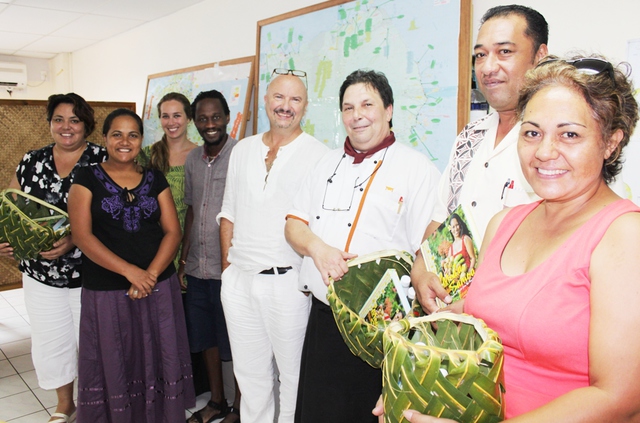Farm to Table Samoa hits local menus

Samoa’s first Farm to Table programme is linking small organic farmers with leading hoteliers and restaurateurs in a bid to boost the farming and tourism industry.
Women in Business Development is working with renowned chef/author Robert Oliver to kick start a local supply programme that has gained the support of the United Nations Development Programme (UNDP).
Women in Business Development executive director Adimaimalaga Tafuna’i says the programme is essentially a youth-focussed programme with the first phase being about establishing the market.
“As with all our income programmes, one of the key success factors is securing a steady market. In this first two-month phase, we will be refining a consistent supply system and analyzing what the most popular vegetables are and then creating a growing course with and for youth.
“Right now we have five farmers supplying Sinalei Reef Resort and Spa, Tanoa Tusitala Hotel, Milani Café, Bistro Tatau and The Coffee Bean cafes. Our pilot group of hotels, restaurants and farmers are extremely committed to bearing with us as we refine the process.
“Already they have told us they would like an earlier delivery time so we are changing our schedules to accommodate this. To keep the deliveries going during the festive season, several farmers and staff will also be working right through.”
Tafuna’i says the programme is timely because of the United Nations Small Island Developing States meeting in Samoa in September, which will attract more than 3000 people to the nation’s shores.
UNDP Resident Representative Lizbeth Cullity says UNDP is pleased to work in partnership with Women in Business Development, which is doing a marvellous job in promoting organic farms in Upolu and Savaii.
“We believe that the future of agriculture in Samoa is in ‘niche products’ that are organic, fresh produce including fruits, vegetables, coffee, vanilla, and so forth.
“Organic produce is a multi-million dollar market and Samoa is naturally blessed with favourable soil and climate,” says Cullity. “What we need is good branding and to promote local Samoan products as ‘truly organic’.
“UNDP is happy to support this partnership initiative, which creates employment, food security, reduces food import bills and related non-communicable diseases due to substandard food imports; earns foreign exchange and puts Samoa in an exclusive status as an organic country.”
Oliver says that on the face of it, the Farm to Table Samoa looks like a simple producer–buyer arrangement but actually it is more than that.
“People travel for food and Samoa has not been pitched that way to tourists but it has enormous potential because the fresh produce and seafood is so good here. Local food ingredients also give tourists a more authentic experience.
“Our first product is really consistency,” says Oliver. “We work on a system of only guaranteeing supply that we can guarantee – and this is done through talking with our farmers so they appreciate the pressures that hotels and restaurants are under.”
Oliver last month launched his book Mea’ai Samoa: Recipes from the heart of Polynesia, which follows on from the award-winning Mea Kai: The Food and Flavours and the South Pacific.
The chef/author added that Samoan cuisine requires Samoan agriculture and “we will be looking to integrate cuisine development into the Farm to Table programme”.
Oliver developed a similar supply system in the Caribbean that covered two countries, three resorts and included 40 farmers and a farmer co-op with 80 members in St Lucia, and 20 farmers in Barbadoes.
“This is a system that can assist our many small farmers out there to earn a consistent income, plan their farms to service contracts and help our tourism and local farming industry become more sustainable. This is also about creating career pathways for Samoa’s youth.”
He estimates that more than 80 per cent of the food that appears in Samoa’s restaurants and hotels is imported.
UNDP partners with people at all levels of society to help build nations that can withstand crisis, and drive and sustain the kind of growth that improves the quality of life for everyone. On the ground in 177 countries and territories, we offer global perspective and local insight to help empower lives and build resilient nations
Posted: Mon 23 Dec 2013

